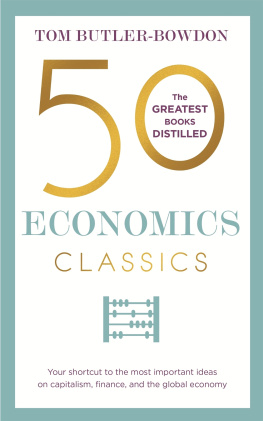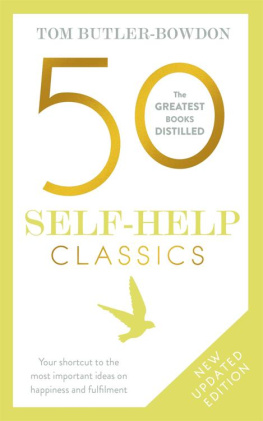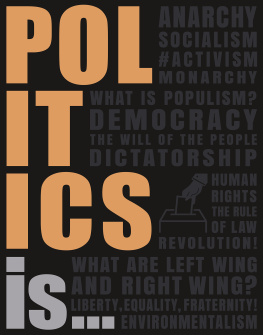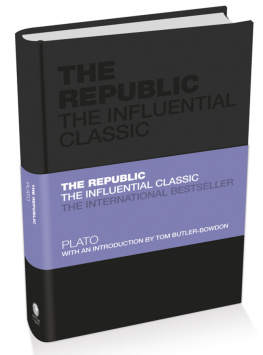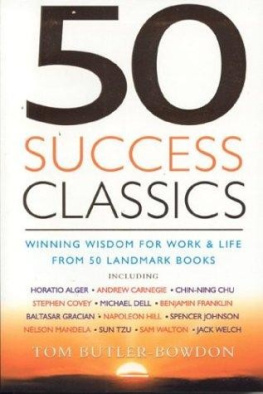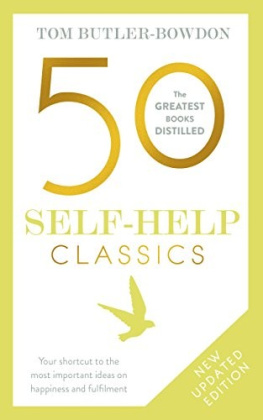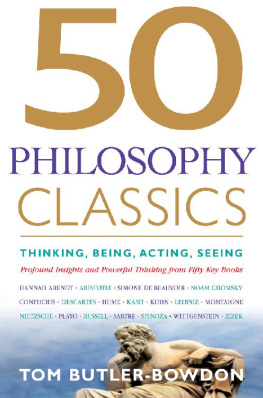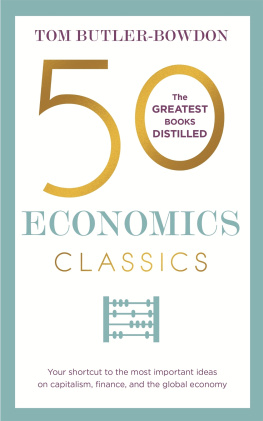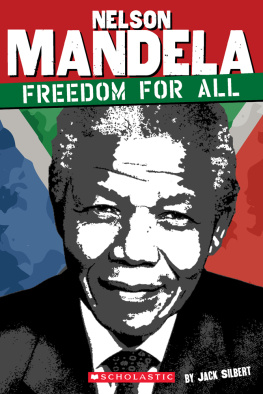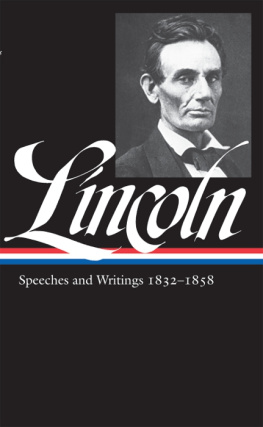Praise for the
50 Classics Series
Butler-Bowdon writes with infectious enthusiasm he is a true scholar of this type of literature.
USA Today
A brilliant synthesis. The author makes complex ideas accessible and practical, without dumbing down the material.
Douglas Stone, Harvard Law School
Complex views on a range of important and enduring issues are made accessible Enjoyable and instructive.
CL Ten, National University of Singapore
Tom Butler-Bowdon is an expert on the literature of possibility, covering self-help, motivation, spirituality, prosperity, psychology and philosophy. USA Today described him as a true scholar of this type of literature. His first book, 50 Self-Help Classics, won the Benjamin Franklin Award and was a Foreword magazine Book of the Year. The 50 Classics series has sold over 300,000 copies and has been published in 23 languages. A graduate of the London School of Economics and the University of Sydney, Tom lives in Oxford, UK, and Australia.
Visit his website at www.butler-bowdon.com

by Tom Butler-Bowdon
The 50 Classics series has sold over 300,000 copies
50 Self-Help Classics 978-1-85788-323-7
50 Success Classics 978-1-85788-333-6
50 Spiritual Classics 978-1-85788-349-7
50 Prosperity Classics 978-1-85788-504-0
50 Psychology Classics 978-1-85788-386-2
50 Philosophy Classics 978-1-85788-596-5
50 Politics Classics
Freedom, Equality, Power
Mind-changing ideas,
world-changing books
Tom Butler-Bowdon

First published by
Nicholas Brealey Publishing in 2015
|
|---|
35 Spafield Street | 20 Park Plaza |
Clerkenwell, London | Boston |
EC1R 4QB, UK | MA 02116, USA |
Tel: +44 (0)20 7239 0360 | Tel: (888) BREALEY |
Fax: +44 (0)20 7239 0370 | Fax: (617) 523 3708 |
www.nicholasbrealey.com
www.butler-bowdon.com
Tom Butler-Bowdon 2015
The right of Tom Butler-Bowdon to be identified as the author of this work has been asserted in accordance with the Copyright, Designs and Patents Act 1988.
ISBN: 978-1-85788-629-0
eISBN: 978-1-85788-952-9
British Library Cataloguing in Publication Data
A catalogue record for this book is available from the British Library.
All rights reserved. No part of this publication may be reproduced, stored in a retrieval system, or transmitted, in any form or by any means, electronic, mechanical, photocopying, recording and/or otherwise without the prior written permission of the publishers. This book may not be lent, resold, hired out or otherwise disposed of by way of trade in any form, binding or cover other than that in which it is published, without the prior consent of the publishers.
Printed in Finland by WS Bookwell.
Contents

Introduction
What kind of society offers the most freedom, the greatest chance for equality between its members, and yet possesses the most power to protect these values? Which understanding of the state is best? These questions are as important to us now as they were in ancient Greece, and in this book I look at some of the most notable answers, old and new, via commentaries that aim to give a sense of the key writings and the context in which they were written.
50 Politics Classics provides insights into the books, pamphlets, and speeches of major leaders, from Abraham Lincoln and Winston Churchill to Margaret Thatcher, and texts from Hobbes Leviathan to Fukuyamas The End of History and the Last Man that have changed minds and changed the world. In politics the written word matters, because it has frequently driven real-world change: Rousseaus The Social Contract and Discourse on Inequality helped inspire the French Revolution; The Federalist Papers of Hamilton, Madison, and Jay gave crucial gravitas to those calling for a new American constitution; Marx and Engels The Communist Manifesto galvanized oppressed workers but led to a divided world for almost a century; Solzhenitsyns The Gulag Archipelago and Arendts The Origins of Totalitarianism exposed the evil at the heart of the totalitarian regimes of Stalin and Hitler; and Hayeks Road to Serfdom and Orwells Animal Farm damned collectivist central planning as the means to a just society. Sun Yat-sens Three Principles of the People was essential in building the case for a Chinese republic free of centuries of dynastic rule or colonial powers, and Thoreaus Civil Disobedience inspired Gandhi, Nelson Mandela, and Martin Luther King in their campaigns for justice. Carsons Silent Spring was the catalyst for the modern environmental movement, and Kleins No Logo crystallized the feelings of anti-globalization protesters. A more recent example of the relevance of political classics is the popularity of Voltaires Treatise on Tolerance, an attack on religious fanaticism that climbed the French bestseller lists following the Charlie Hebdo killings.
The ideas of economists and political philosophers are more powerful than is commonly understood, John Maynard Keynes said. Indeed, the world is ruled by little else. Practical men, who believe themselves quite exempt from intellectual influence, are usually slaves of some defunct economist. In this book I focus on political philosophy, although it does include some political economy titles such as Hayeks The Road to Serfdom and Acemoglu and Robinsons Why Nations Fail. Obviously the two domains overlap, and as economics deserves a volume of its own, I plan to follow this book with 50 Economics Classics.
50 Politics Classics spans 2,500 years, left and right, thinkers and doers, and covers economists (Mancur Olson), activists (Saul Alinsky), war strategists (Clausewitz), visionary leaders (Sun Yat-sen), philosophers of freedom (Lord Acton, Isaiah Berlin, Robert Nozick), agitators on the Left (Jean-Jacques Rousseau, Emma Goldman, Mary Wollstonecraft), and conservatives (Edmund Burke). It also considers liberalism, a political philosophy that emphasizes personal freedom as the highest value along with open societies and market economies.
Whether you consider yourself to be conservative, liberal, socialist, or Marxist, this book may give you more insight into the development of philosophies you oppose and the individuals behind them. I try to give a sense of the real people behind legends of political leadership such as Lincoln, Churchill, Gandhi, King, and Mandela, whose achievements demonstrate that the power of One is remarkably important in the great reform movements and fights for justice, and in government itself. Decisions by individual presidents and prime ministers still count, not only in policy matters but in guiding national consciousness.
Man is by nature a political animal. Aristotle
Next page

